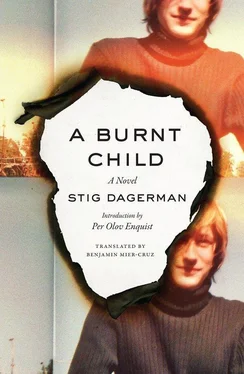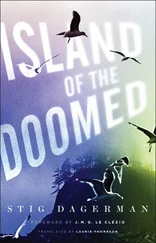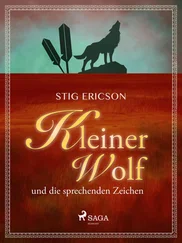He is smiling with expectation when they come up to him with towels. His legs start to weaken, but they still manage to carry him. He is gentle and happy, and he can’t understand why the people approaching him are so worried. He has already been dying for an infinitely long time by the time they reach him. He has no sense of time anymore. Everything is happening in slow motion, although in reality it’s happening at a blistering speed. In the dream, he hears someone calling his name, and he sedately stretches out his bleeding arm to the towel—not sensing that this is going save him. He thinks it’s only nice that Gun has taken his hand in hers. His hatred has drained out of him. His tiger has died from loss of blood. Even the gazelle is dead now. The only thing left is a resigned tenderness. If he could, he would caress all three of them, as their hands support his feeble body and carry him back to the alcove and into Gun’s bed. He is alone with Gun for a second. Smiling, he asks her:
Do you think I’m going to die?
Lie still, she whispers, holding the towel over him.
Then she kisses him. He just lies there with the towel pressed against his wound. Hour after hour passes. The blood begins to slowly seep through the thick towel. He hears the distant sound of frantic footsteps and the slamming of doors. He can’t understand why they are in such a hurry.
People who witness an accident start to feel—once the initial alarm has subsided—a strange sensation of exhilaration that is closely related to joy. Laughter is the only thing missing. All three of them feel this curious joy as they prepare for the ride. They move around as though intoxicated, only without the drunken sluggishness; instead, their movements are quick and precise. When they are ready, they carry him with great strength through the snow and down to the sleds. As they place him gently into the new sled, the father finds the leash on the ground. Then he wraps it around the son’s leg and the sled’s handles so that he won’t slip off.
Very weak yet still filled with the same joyous calm, Bengt can sense everything that is happening. Just before the sled begins to glide over the ice, he hears the father say:
Thirty-two below.
The words sound so familiar, but he forgot what they mean. He simply thinks it sounds beautiful. He quietly repeats the words to himself for as long as he can. Then he gazes out at the ice and the moon. The moon is white and beautiful, but strangely far away. The ice is also white. The air is very warm. Then he closes his eyes and listens to all the beautiful sounds of the night. The night sings with silence. It’s the greatest sound of all. Then there are fainter sounds: the rhythmic slicing of the ice from the spikes; the soft singing of the runners as they race over the black ice; the slight creaking of the kicksled’s wood; the harsh scraping as they pass over granular ice.
The journey goes by in a flash. The sleds glide neck and neck to shore. Gun is pushing Berit, who is not crying. She is very calm and very tired. The trip is endlessly long for her, endlessly beautiful and endlessly long. It lasts an eternity for him, too. He can’t even comprehend distance anymore. To be dying is to be like a child. In the end, you don’t understand a thing: nothing about death and nothing about life, only that all distances are the same and all words are unintelligible—yet beautiful.
The sleds stop below the tall jetty. They wait underneath its shadow as the father runs toward the village. From the shadow, Bengt has a view of the beautiful moonlight. Gun bends down and unties the leash.
Are you cold? she whispers.
No, he whispers back.
He doesn’t really understand what she said; he only sensed it. Bengt, Berit whispers respectfully, as one does to the sick.
She holds his right hand for a while. Then she leans over and kisses him with her cold lips. Immediately after, they hear the taxi rumbling downhill. Snow chains are wrapped clumsily around the tires. The two women lift him onto the jetty, and he sits between them in the car. They are driving very fast; he doesn’t recognize where they are. The car skids into curbs and his body ricochets between the two women’s bodies; between one soft body and one hard one; between the one that knows everything and the one that knows nothing. He loves them both equally, for he loves everything now. He even loves his father.
It’s thirty-two below, he hears the father saying.
Thirty-one, corrects the driver.
The road is fringed by tall white borders with branches in them. In the beam of the headlights, one neighborhood after the other emerges from the snow and quickly sinks down again. The driver has put some red paper over one of the headlights. Gun dabs a drop of perfume onto Bengt’s lips so that he won’t smell like alcohol. When they near the city, his head begins to clear up a little without costing him any of his bliss. At the toll, he notices the car speeding over a safety island and onto the wrong side of the road to save time. Then he starts to suspect what is happening: he is going to be saved.
But he isn’t sure of it until they swerve up to the foot of the tall lampposts in front of the hospital. When he steps out of the car, he can feel that it’s very cold. It isn’t until then that he is afraid—not so much of what is going to happen but of what he is going to say.
What will I say? he whispers helplessly as the doors open.
But nobody hears him. The corridor is warm and bright, and far ahead is an opened door. He goes through it by himself. The room is enormous and shiny. The cabinets glisten, the instruments glisten, and the operating table glistens. A nurse unbuttons his jacket and gently peels it off him. He manages to lay himself on the table. Then a white lamp hovers over him and shines into his eyes. The nurse takes his arm and gently unwraps the towel. He turns his head and looks at his wound. It is long and very deep. It is also hollow and almost white. The nurse gently turns his head away, so he looks down at his body instead. His shirt is stained brown with blood. He doesn’t really understand why. Then he senses that she is cleaning his hand. It does not hurt.
When she asks him his name, he tells her, but he doesn’t recognize it and is afraid he has said something wrong. He doesn’t recognize his address either. He turns his head and looks at her. Her glasses are glistening, and behind the lenses her eyes are glistening, too. When she asks him how this happened, he answers that he was trying to split wood with a knife.
When the doctor comes in, he likes him immediately. While they are busy with his hand, he looks at it. Although he doesn’t recognize it, he is still interested in seeing it. And after the local anesthetic, it belongs to him even less. The thread is thick like a violin string. The doctor sticks it in and out of the foreign wrist. Finally, he snips off the protruding ends with a small pair of shiny scissors. He is weak and blissful—blissful even though he knows he is saved. Even afterward, his joy persists, the same joy as before. After all, dying and being saved arouse the same mild joy.
As the nurse applies the bandage, the doctor stays put and stares at him. Suddenly, he says:
Why were you splitting wood in the middle of the night?
It was thirty-two below, he answers.
The doctor pulls the lamp away, nearly leaving him in darkness. And from the darkness, he hears the low, familiar voice again. Why were you cutting wood with a razor? he asks.
He’s unable to answer. But when he looks up from the darkness, he sees the doctor looking at his right hand.
I burnt myself, he whispers, burnt myself on a candle.
He climbs off the table by himself, and the nurse lifts his arm into a sling. When he reaches the door, he notices that the doctor has followed behind him. Just as he is about to walk out, he hears the doctor say, in a voice low enough so that only the two of them can hear:
Читать дальше












